There are some experiences in life that we wish were never part of our story. For me, it’s the experience of being the one left behind. I don’t mean left in the middle of a department store as a child. Or left behind in some race. Or left behind from participating in some amazing adventure.
I mean left behind to live a life in the wake of suicide. Multiple suicides. Yes, more than one.
Being the one left behind is a part of my life story that I’ve never publicly shared before. Partly because it’s not only my story. It’s the story of friends lost to tragedy. It’s the story of friends surviving tragedy. It’s a story that might trigger wounds. It’s a story that could plant ideas.

This story of mine intertwined with so many others . . . this experience with suicide . . . has no doubt been a part of what motivates me to inspire and equip women to step into biblical mentoring relationships with next generation.
It’s why I volunteered as a youth group leader, only a year out of college and as a brand new Christian. It is part of the reason why I welcomed the opportunity to join my husband in his work at a boarding school and speak into the next generation. It’s also why I hosted ETC as a safe-haven for teen girls to open up to the pressures they feel, because I know what could happen if their wounds and worry go unnoticed.
Being the one left behind, multiple times, is what makes me bold and brazen when it comes to dealing with bullies, pursuing isolated teens, and advocating for counseling from Christian mental health professionals.
Suicide is a risk for anyone struggling with trauma, isolation, or depression. That’s why I’ll not hesitate to turn a prospective client towards counseling, knowing I may be the only one they ever heed with my “expert” status.
The first time I met suicide’s wrath was as a high school senior.
While the girl was a stranger, her death has never become unfamiliar. It left too many questions in my mind: What happens in a heart that leads to that kind of decision? Would a close friend choose the same outcome? Could I prevent it? Would I see the signs?
The second time, right after college, was when I realized I could see it coming and left me with a haunting questions.
I learned the hardest way possible that showing someone you appreciate them requires more than an “I love you” with a hug goodbye as you run into your own independent life. What if I had stayed in touch? What if I had shown her I valued you. I also learned that depression and drugs are a dangerous combination.
The third time renewed my hatred for guns and made me angry over the stigma surrounding the treatment of depression.
[Tweet “We do irreparable damage when we make depression feel like a failure of faith. #livewell #worthyliving”]
The call I received from my friend, his sister, crushed my soul. Words couldn’t comfort. There was nothing I could do but tell her I love her and walk with her in the moment.
The fourth time was another friend from high school.
Yes, that makes two from my inner circle. We drifted apart long before I heard of his death, but that didn’t make it hurt any less. I’m so thankful I don’t know the details, because my mind only remembers his ear-to-ear grin and hearing him sing his best Bono impression of “With or Without You.” I still wish this world wasn’t without him.
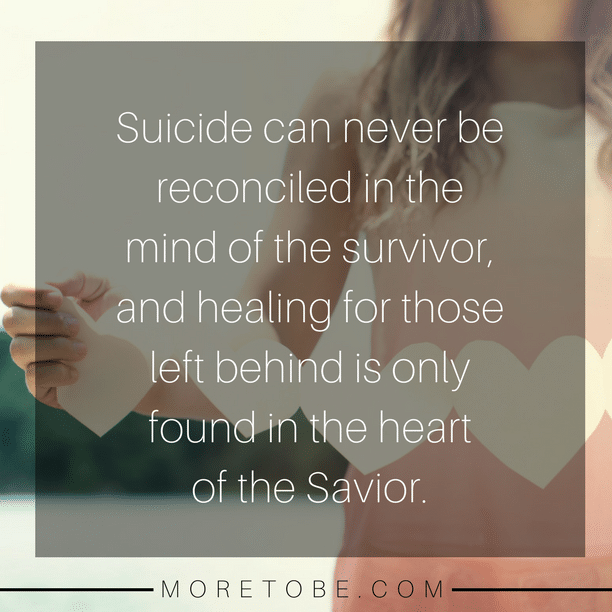
The fifth time is still too fresh. Fresh pain. Fresh wounds.
Time has passed but the grieving isn’t gone. No one saw it coming. No one could have stopped it. There were no signs. There was no evidence of depression, just joy. There were no drugs. There was no gun. This one doesn’t fit the profile.
It’s because of this one, grieving alongside my children and husband, that spurs me on to share my story and the ways God may be leading us to make a difference.
We can’t take back his life, but we can be more intentional about loving those God has placed in arms reach.
The sixth time brought the waves of emotion from all the rest crashing forth.
This time, I was back to being the friend of a grieving friend left barely standing upon hearing the news, in the middle of a super store over text message no less. Please, just don’t ever do that. Not ever. How do you console your friend, when her grief triggers yours? What do you say when there are no words? When even in searching to find the answer, there is never an answer.
That’s the thing about suicide. You really won’t ever know what happened. It feels like the answers will bring healing, but healing has to be found elsewhere.
Suicide can never be reconciled in the mind of the survivor, and healing for those left behind is only found in the heart of the Savior.
Psalm 34:18
The same God who heals the brokenhearted, inflicted with the devastation of suicide, is the same God who can rescue the very one who saw no way out. But for those of us left behind, we’re left wondering why? Why didn’t God come to the rescue?
We may never know the answer. And that’s okay. Sometimes it is actually better left unanswered.
Only God knows, and it’s okay if He doesn’t give us understanding. Please, please, no more preaching of Romans 8:28 in the wake of suicide. Even if the Scriptures are always true, in the moment, it doesn’t feel that way.
Let the grieving grieve.
Let them find their healing in the heart of God.
Be His hands and feet as you serve, quietly and practically over the longest haul yet to come.
And, if nothing else, become an advocate for life while you remain in the land of the living.
[Tweet “Learn how to love well, so that others know their lives are worth living. “]
Because there are plenty of reasons why the hurting, and especially those left behind, might believe another story. Isn’t that the fear of what might happen through the influence of the book-inspired Netflix series, Thirteen Reasons Why?
In case you haven’t been brought up to speed, Thirteen Reasons Why is a tragic story about a teen who committed suicide and left 13 tapes for her “friends” to discover their role in her death. Yes, it’s as awful as that sounds. I subjected myself to watching the first episode, feeling responsible to do so as a parent, mentor, and ministry leader since the target audience is tweens and teens. But I’ve not been able to bring myself to watch any more. The pain is too personal. The triggers too traumatic. I’ve seen enough to know that the series captures grief and gore in a way that should be left to the imagination. Yes, they filmed it well. They wrote a good script. They show the pain caused by bullying and isolation, by rape and betrayal, by uninvolved adults and clueless parents. And they show the shock and denial, pain and guilt, and regret and anxiety of those left behind.
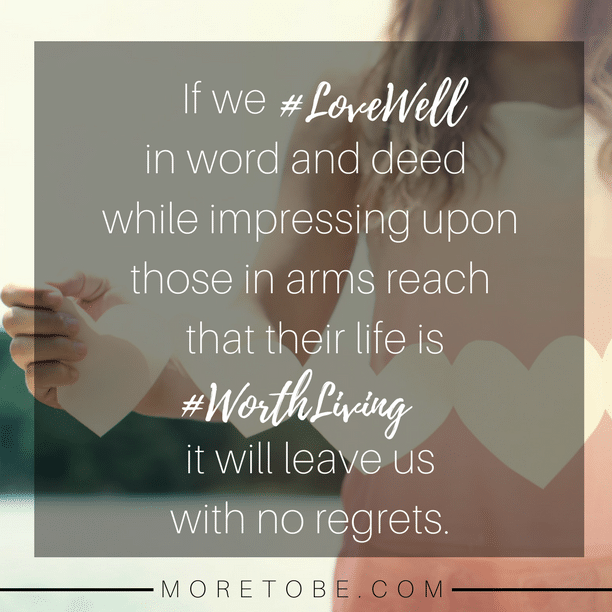
Thirteen Reasons Why shows the pain, but did they provide a solution?
The truth is this series might ignite a rash of suicides or prevent them. Maybe it will raise awareness and lead to real life rescues. Or maybe it will plant ideas in the minds of those eager to receive such a seed of thought and conceive of a way to follow out a tragic plan. It may also make those left behind believe that death is what they now deserve. That’s what scares me most. Because as one left behind, I feel hard for them.
The never ending question of “What could I have done differently?” is the nagging storyline for all of the 13 characters in Thirteen Reasons Why.
But they couldn’t do it differently because they didn’t know.
The one thing I hope Thirteen Reasons Why does most of all is bring to light that suicide prevention isn’t hinged on a TV show or documentary or a set of rules to follow or a discussion guide. Friends, suicide prevention isn’t just about seeing the risks. It’s not just about tackling depression. It’s not about gun control or drug laws. Yes, all those factors matter. Yes, education matters! Spend some time at the American Foundation for Suicide Prevention website. Read the horrifying stats. Launch a You Can Not Be Replaced campaign. Engage the next generation in a dialogue that provides skills and roadmaps in times of crisis.
But don’t do all these things and go on ignoring the one thing that might matters most . . .taking ownership of the ways you engage with the people God has put in your life today.
We may not be able to stop that person bent on suicide. We may end up, like I have, being the one left behind. But I can promise you this:
If we love well in word and deed, while impressing upon those in arm’s reach that their life is worth living, it will leave us with no regrets.
In each case of the suicides I’ve experienced, I’m convinced that the factor of mental health can not be overlooked. However, I’m also left with this conviction: One of the greatest ways we have the potential (not guarantee) of minimizing suicide is through intentionally pursuing the hearts of those God has put near us.
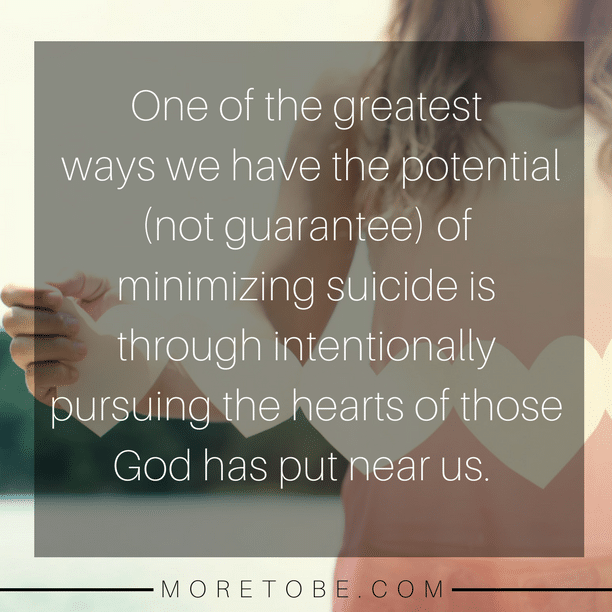
I’m not saying we can do it perfectly.
But is it possible that we could make a difference? Isn’t it worth the effort?
Yet to love others well, we first have to be loved well. We have to receive what God has for us, invite Him into the inner sanctuary of our hearts and minds, so that He can flow through us as His holy, chosen, and dearly loved children (Romans 10:9-10, Romans 12:2, Colossians 3:3).
We are His ambassadors. We are His hands and feet.
There’s only one Jesus, who lived a life we could never live and died a death we could never die.
[Tweet “The hurting need more of Jesus and less of us. #lovewell #worthliving”]
But to offer more like Jesus, we’ve got to consider if we’re operating from a place of wholeness in our own identity established in Christ. We need to think like Jesus, to act like him. And that happens when we invite God to get into our thinking in order to change our living. From that kind of transformation, God can open up doors of opportunities to love well from the overflow of His love and truth and grace abiding in us.
[Tweet “If we are all made in the image of God, then we all inherently have value. #lovewell “]
Every life matters. Every person makes a difference in this world.
So shall we put off denying our impact in the mission to love well? Shall we quit hiding from our own wounds that in turn cause us to wound others? Shall we get our hearts right before the Lord and find the healing we need, so that we can be a vessel of His love?
Shall we, the broken-redeemed, become the most radical example of the Redeemer’s love in His mighty rescue plan?
***
#LoveWell Challenge
If you’re ready to take the next step toward loving others well, use the questions below to guide an honest time of reflection with God. Then decide how you’ll move forward differently in the mission to love others well.
13 Questions to Evaluate Your Effectiveness in Loving Well
- What am I doing to notice and serve the needs of the people God has placed in my life that makes them feel seen and known?
- How am I speaking life into lives of the people I live with, work with, worship with?
- In what ways am I cutting people down with critical or sarcastic comments, and where is that coming from within me?
- How am I sowing a Christ-centered identity into the people I’m in relationship with through affirming what the Scriptures say about them being made in the image of God?
- How am I seeking God’s provisions, healing, and protection over those I’m in relationship with?
- Am I cultivating an environment in my home, church, workplace, friend group, or school that is safe for open dialogue and honest conversation?
- Am I modeling a life of owning my sin and seeking God’s forgiveness as well as the forgiveness of others when I hurt them?
- Am I modeling a life of getting help to deal with my sin, issues, strongholds, and emotional challenges?
- Am I making time to develop relationships through shared common experiences that are life-giving, even with those who seem so very different than me?
- Am I making margin space to connect with a few on a deeper emotional level and not just superficially connecting through social media or in group situations?
- Am I an advocate for the underdog, the weak, the defenseless, the orphan, the widow, the poor?
- Am I an advocate for treating depression with a Christian counselor and mental health professional, either by my own example or by supporting those on this difficult journey?
- Am I willing to be unfriended, and even the target of anger, in order to help someone in crisis, because an angry living friend is better than a dead one?
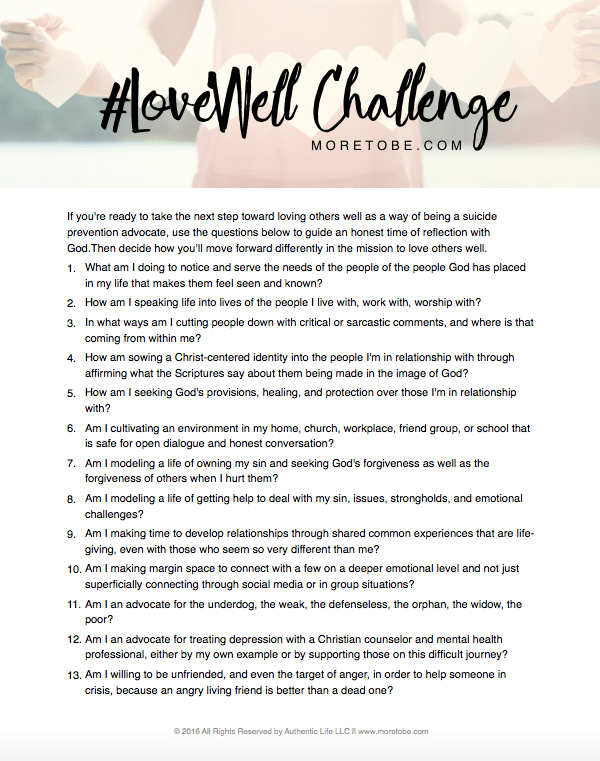
#WorthLiving Challenge
If you’ve ever struggled with wondering if your life matters, you’re not alone. Questioning our worth and value can be a daily, if not moment-by-moment, challenge especially in the face of obstacles and opposition, rejection and isolation. But friend, your life is worth living. Your life is valuable. Your life is priceless in the eyes of God.
Take the #WorthLiving challenge by printing out this list and making time to reflect on these truths. Maybe put them in your phone as reminders. And go the next step by sharing one of these truths each day to a friend by text, a note, email, or posting and tagging on social media.
13 Reasons Why Your Life is Worth Living *
- There is no other person like you on this planet. There is only one you and you are irreplaceable. (Psalm 139)
- When God made you, He didn’t make a mistake. He not only knit you together as uniquely you, but he also made you in His own image. (Genesis 1:27)
- You were created by God for a good purpose, and no one else can fulfill that purpose but you. (Ephesians 2:10)
- You don’t have to struggle alone. God has designed us so that we would be able to seek him out for counseling through the work of the Holy Spirit, who we receive through faith in Jesus Christ, and also in turn comfort others with His comfort. (John 14:26, 2 Corinthians 1:3)
- You’re in the middle of a battle. Yes, right now. The enemy of God, Satan himself, seeks to steal, kill, and destroy everyone and everything God created, but Jesus came to give us life to the fullest. (John 10:10)
- The battles we find ourselves in with bullies, abusers, and enemies on this earth are fought in two ways — the earthly one, through seeking help from trustworthy advocates, and spiritual one, through using the Word of God and power of Holy Spirit in prayer. (Matthew 18:15-17, Ephesians 6:10-19)
- The influence for good you can have in this world may very well come from your victory over the battle you’re facing right now. Imagine that person whose life you might change, when you one day tell your story of victory won by the power of God. (2 Corinthians 3:3)
- You have a valuable role to play in the family of God. Even your weaknesses can be used by God as much as your gifts, talents, and strengths. (1 Corinthians 12)
- No matter what you’ve come from, what you’ve endured, what you’ve done, God’s forgiveness, grace, mercy, and healing are always available to you. (Psalm 103:12, Acts 13:38)
- No matter how you’ve been wounded, you can be set free to move forward as a new creation. (John 8:36, 2 Corinthians 5:17)
- By the grace of God at work in your life, you have the opportunity to influence lives at any age and stage, and by embracing that call, you’ll leave a remarkable legacy. (Titus 2, 1 Timothy 4:12)
- You are chosen. You are holy. You are dearly loved. Always. (Colossians 3:12, 1 Peter 2:9)
- Choose life always. Because until God takes you home, your mission on this earth is simply not yet done. (Philippians 1:6)
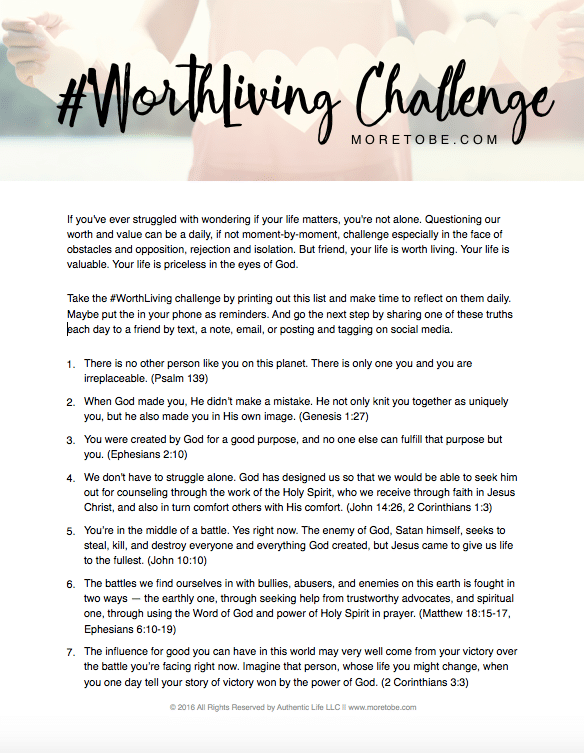
*You might have come across lists similar to this one. I intentionally did not read any of those lists, knowing I wanted to create the #worthliving challenge when I shared my story. If you see duplicate points, it simply affirms a truth God may want to impress upon you.
Noteworthy Resource Links
- Identifying Suicide Risks Factors
- Find Professional Help
- American Foundation for Suicide Prevention
- The stats
- You Can Not Be Replaced campaign
- Reflections from a Mom and More to Be Contributor
- Discussion Questions for Parents and Educators
- Five Things You Should Know About Stress
- Guide for Parents from Focus on the Family




I am so sad that you and those around you have suffered so, and my heart truly aches for those lost. It certainly is a war against the powers of darkness. As a teen, my attempt was surrounded with, “You’re taking the chicken’s way out,” etc. My heart goes out to both sides of the equation. Jesus truly is the answer but He uses others to walk alongside in the process. Love in action and prayer are our greatest weapons. Thanks for sharing. ?